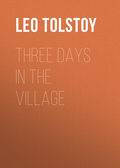
Лев Толстой
The Light Shines in Darkness
STYÓPA. That means to die.
NICHOLAS IVÁNOVICH. Yes, even if you gave your life for your friends, that would be splendid both for you and for others. But the fact is that man is not solely a spirit, but a spirit within a body; and the flesh draws him to live for itself, while the spirit of light draws him to live for God and for others: and the life in each of us is not solely animal, but is equipoised between the two. But the more it is a life for God, the better; and the animal will not fail to take care of itself.
STYÓPA. Why choose a middle course: an equipoise between the two? If it is right to do so – why not give away everything and die?
NICHOLAS IVÁNOVICH. That would be splendid. Try to do it, and it will be well both for you and for others.
ALEXÁNDRA IVÁNOVNA. No, that is not clear, not simple. C'est tiré par les cheveux.25
NICHOLAS IVÁNOVICH. Well, I can't help it, and it can't be explained by argument. However, that is enough.
STYÓPA. Yes, quite enough, and I also don't understand it. [Exit].
NICHOLAS IVÁNOVICH [turns to Priest] Well, what impression did the book make on you?
PRIEST [agitated] How shall I put it? Well, the historic part is insufficiently worked out, and it is not fully convincing, or let us say, quite reliable; because the materials are, as a matter of fact, insufficient. Neither the Divinity of Christ, nor His lack of Divinity, can be proved historically; there is but one proof…
During this conversation first the ladies and then Peter Semyónovich go out.
NICHOLAS IVÁNOVICH. You mean the Church?
PRIEST. Well, of course, the Church, and the evidence, let's say, of reliable men – the Saints for instance.
NICHOLAS IVÁNOVICH. Of course, it would be excellent if there existed a set of infallible people to confide in. It would be very desirable; but its desirability does not prove that they exist!
PRIEST. And I believe that just that is the proof. The Lord could not in fact have exposed His law to the possibility of mutilation or misinterpretation, but must in fact have left a guardian of His truth to prevent that truth being mutilated.
NICHOLAS IVÁNOVICH. Very well; but we first tried to prove the truth itself, and now we are trying to prove the reliability of the guardian of the truth.
PRIEST. Well here, as a matter of fact, we require faith.
NICHOLAS IVÁNOVICH. Faith – yes, we need faith. We can't do without faith. Not, however, faith in what other people tell us, but faith in what we arrive at ourselves, by our own thought, our own reason … faith in God, and in true and everlasting life.
PRIEST. Reason may deceive. Each of us has a different mind.
NICHOLAS IVÁNOVICH [hotly] There, that is the most terrible blasphemy! God has given us just one sacred tool for finding the truth – the only thing that can unite us all, and we do not trust it!
PRIEST. How can we trust in it, when there are.
NICHOLAS IVÁNOVICH. Where are the contradictions? That twice two are four; and that one should not do to others what one would not like oneself; and that everything has a cause? Truths of that kind we all acknowledge because they accord with all our reason. But that God appeared on Mount Sinai to Moses, or that Buddha flew up on a sunbeam, or that Mahomet went up into the sky, and that Christ flew there also – on matters of that kind we are all at variance.
PRIEST. No, we are not at variance, those of us who abide in the truth are all united in one faith in God, Christ.
NICHOLAS IVÁNOVICH. No, even there, you are not united, but have all gone asunder; so why should I believe you rather than I would believe a Buddhist Lama? Only because I happened to be born in your faith?
[The tennis players dispute] “Out!” “Not out!”
VÁNYA. I saw it …:
During the conversation, men-servants set the table again for tea and coffee.
NICHOLAS IVÁNOVICH. You say the Church unites. But, on the contrary, the worst dissensions have always been caused by the Church. “How often would I have gathered you as a hen gathers her chickens.” …
PRIEST. That was until Christ. But Christ did gather them all together.
NICHOLAS IVÁNOVICH. Yes, Christ united; but we have divided: because we have understood him the wrong way round. He destroyed all Churches.
PRIEST. Did he not say: “Go, tell the Church.”
NICHOLAS IVÁNOVICH. It is not a question of words! Besides those words don't refer to what we call “Church.” It is the spirit of the teaching that matters. Christ's teaching is universal, and includes all religions, and does not admit of anything exclusive; neither of the Resurrection nor the Divinity of Christ, nor the Sacraments – nor of anything that divides.
PRIEST. That, as a matter of fact, if I may say so, is your own interpretation of Christ's teaching. But Christ's teaching is all founded on His Divinity and Resurrection.
NICHOLAS IVÁNOVICH. That's what is so dreadful about the Churches. They divide by declaring that they possess the full indubitable and infallible truth. They say: “It has pleased us and the Holy Ghost.” That began at the time of the first Council of the Apostles. They then began to maintain that they had the full and exclusive truth. You see, if I say there is a God: the first cause of the Universe, everyone can agree with me; and such an acknowledgment of God will unite us; but if I say there is a God: Brahma, or Jehovah, or a Trinity, such a God divides us. Men wish to unite, and to that end devise all means of union, but neglect the one indubitable means of union – the search for truth! It is as if people in an enormous building, where the light from above shone down into the centre, tried to unite in groups around lamps in different corners, instead of going towards the central light, where they would naturally all be united.
PRIEST. And how are the people to be guided – without any really definite truth?
NICHOLAS IVÁNOVICH. That's what is terrible! Each one of us has to save his own soul, and has to do God's work himself, but instead of that we busy ourselves saving other people and teaching them. And what do we teach them? We teach them now, at the end of the nineteenth century, that God created the world in six days, then caused a flood, and put all the animals in an ark, and all the rest of the horrors and nonsense of the Old Testament. And then that Christ ordered everyone to be baptized with water; and we make them believe in all the absurdity and meanness of an Atonement essential to salvation; and then that he rose up into the heavens which do not really exist, and there sat down at the right hand of the Father. We have got used to all this, but really it is dreadful! A child, fresh and ready to receive all that is good and true, asks us what the world is, and what its laws are; and we, instead of revealing to him the teaching of love and truth that has been given to us, carefully ram into his head all sorts of horrible absurdities and meannesses, ascribing them all to God. Is that not terrible? It is as great a crime as man can commit. And we – you and your Church – do this! Forgive me!
PRIEST. Yes, if one looks at Christ's teaching from a rationalistic point of view, it is so.
NICHOLAS IVÁNOVICH. Whichever way one looks, it is so. [Pause].
Enter Alexándra Ivánovna. Priest bows to take his leave.
ALEXÁNDRA IVÁNOVNA. Good-bye, Father. He will lead you astray. Don't you listen to him.
PRIEST. No. Search the Scriptures! The matter is too important, as a matter of fact, to be – let's say – neglected. [Exit].
ALEXÁNDRA IVÁNOVNA. Really, Nicholas, you have no pity on him! Though he is a priest, he is still only a boy, and can have no firm convictions or settled views…
NICHOLAS IVÁNOVICH. Give him time to settle down and petrify in falsehood? No! Why should I? Besides, he is a good, sincere man.
ALEXÁNDRA IVÁNOVNA. But what will become of him if he believes you?
NICHOLAS IVÁNOVICH. He need not believe me. But if he saw the truth, it would be well for him and for everybody.
ALEXÁNDRA IVÁNOVNA. If it were really so good, everyone would be ready to believe you. As it is, no one believes you, and your wife least of all. She can't believe you.
NICHOLAS IVÁNOVICH. Who told you that?
ALEXÁNDRA IVÁNOVNA. Well, just you try and explain it to her! She will never understand, nor shall I, nor anyone else in the world, that one must care for other people and abandon one's own children. Go and try to explain that to Mary!
NICHOLAS IVÁNOVICH. Yes, and Mary will certainly understand. Forgive me, Alexándra, but if it were not for other people's influence, to which she is very susceptible, she would understand me and go with me.
ALEXÁNDRA IVÁNOVNA. To beggar your children for the sake of drunken Yefím and his sort? Never! But if I have made you angry, please forgive me. I can't help speaking out.
NICHOLAS IVÁNOVICH. I am not angry. On the contrary, I am even glad you have spoken out and given me the opportunity – challenged me – to explain to Mary my whole outlook on life. On my way home to-day I was thinking of doing so, and I will speak to her at once; and you will see that she will agree, because she is wise and good.
ALEXÁNDRA IVÁNOVNA. Well, as to that, allow me to have my doubts.
NICHOLAS IVÁNOVICH. But I have no doubts. For you know, this is not any invention of my own; it is only what we all of us know, and what Christ revealed to us.
ALEXÁNDRA IVÁNOVNA. Yes, you think Christ revealed this, but I think he revealed something else.
NICHOLAS IVÁNOVICH. It cannot be anything else.
Shouts from the tennis ground.
LYÚBA. Out!
VÁNYA. No, we saw it.
LISA. I know. It fell just here!
LYÚBA. Out! Out! Out!
VÁNYA. It's not true.
LYÚBA. For one thing, it's rude to say “It's not true.”
VÁNYA. And it's rude to say what is not true!
NICHOLAS IVÁNOVICH. Just wait a bit, and don't argue, but listen. Isn't it true that at any moment we may die, and either cease to exist, or go to God who expects us to live according to His will?
ALEXÁNDRA IVÁNOVNA. Well?
NICHOLAS IVÁNOVICH. Well, what can I do in this life other than what the supreme judge in my soul, my conscience – God – requires of me? And my conscience – God – requires that I should regard everybody as equal, love everybody, serve everybody.
ALEXÁNDRA IVÁNOVNA. Your own children too?
NICHOLAS IVÁNOVICH. Naturally, my own too, but obeying all that my conscience demands. Above all, that I should understand that my life does not belong to me – nor yours to you – but to God, who sent us into the world and who requires that we should do His will. And His will is …
ALEXÁNDRA IVÁNOVNA. And you think that you will persuade Mary of this?
NICHOLAS IVÁNOVICH. Certainly.
ALEXÁNDRA IVÁNOVNA. And that she will give up educating the children properly, and will abandon them? Never!
NICHOLAS IVÁNOVICH. Not only will she understand, but you too will understand that it is the only thing to do.
ALEXÁNDRA IVÁNOVNA. Never!
Enter Mary Ivánovna.
NICHOLAS IVÁNOVICH. Well, Mary! I didn't wake you this morning, did I?
MARY IVÁNOVNA. No, I was not asleep. And have you had a successful day?
NICHOLAS IVÁNOVICH. Yes, very.
MARY IVÁNOVNA. Why, your coffee is quite cold! Why do you drink it like that? By the way, we must prepare for our visitors. You know the Cheremshánovs are coming?
NICHOLAS IVÁNOVICH. Well, if you're glad to have them, I shall be very pleased.
MARY IVÁNOVNA. I like her and her children, but they have chosen a rather inconvenient time for their visit.
ALEXÁNDRA IVÁNOVNA [rising] Well, talk matters over with him, and I'll go and watch the tennis.
A pause, then Mary Ivánovna and Nicholas Ivánovich begin both talking at once.
MARY IVÁNOVNA. It's inconvenient, because we must have a talk.
NICHOLAS IVÁNOVICH. I was just saying to Aline …
MARY IVÁNOVNA. What?
NICHOLAS IVÁNOVICH. No, you speak first.
MARY IVÁNOVNA. Well, I wanted to have a talk with you about Styópa. After all, something must be decided. He, poor fellow, feels depressed, and does not know what awaits him. He came to me, but how can I decide?
NICHOLAS IVÁNOVICH. Why decide? He can decide for himself.
MARY IVÁNOVNA. But, you know, he wants to enter the Horse-Guards as a volunteer, and in order to do that he must get you to countersign his papers, and he must also be in a position to keep himself; and you don't give him anything. [Gets excited].
NICHOLAS IVÁNOVICH. Mary, for heaven's sake don't get excited, but listen to me. I don't give or withhold anything. To enter military service of one's own free will, I consider either a stupid, insensate action, suitable for a savage if the man does not understand the evil of his action, or despicable if he does it from an interested motive…
MARY IVÁNOVNA. But nowadays everything seems savage and stupid to you. After all, he must live; you lived!
NICHOLAS IVÁNOVICH [getting irritable] I lived when I did not understand; and when nobody gave me good advice. However, it does not depend on me but on him.
MARY IVÁNOVNA. How not on you? It's you who don't give him an allowance.
NICHOLAS IVÁNOVICH. I can't give what is not mine!
MARY IVÁNOVNA. Not yours? What do you mean?
NICHOLAS IVÁNOVICH. The labour of others does not belong to me. To give him money, I must first take it from others. I have no right to do that, and I cannot do it! As long as I manage the estate I must manage it as my conscience dictates; and I cannot give the fruits of the toil of the overworked peasants to be spent on the debaucheries of Life-Guardsmen. Take over my property, and then I shall not be responsible!
MARY IVÁNOVNA. You know very well that I don't want to take it, and moreover I can't. I have to bring up the children, besides nursing them and bearing them. It is cruel!
NICHOLAS IVÁNOVICH. Mary, dear one! That is not the main thing. When you began to speak I too began and wanted to talk to you quite frankly. We must not go on like this. We are living together, but don't understand one another. Sometimes we even seem to misunderstand one another on purpose.
MARY IVÁNOVNA. I want to understand, but I don't. No, I don't understand you. I do not know what has come to you.
NICHOLAS IVÁNOVICH. Well then, try and understand! This may not be a convenient time, but heaven knows when we shall find a convenient time. Understand not me – but yourself: the meaning of your own life! We can't go on living like this without knowing what we are living for.
MARY IVÁNOVNA. We have lived so, and lived very happily. [Noticing a look of vexation on his face] All right, all right, I am listening.
NICHOLAS IVÁNOVICH. Yes, I too lived so – that is to say, without thinking why I lived; but a time came when I was terror-struck. Well, here we are, living on other people's labour – making others work for us – bringing children into the world and bringing them up to do the same. Old age will come, and death, and I shall ask myself: “Why have I lived?” In order to breed more parasites like myself? And, above all, we do not even enjoy this life. It is only endurable, you know, while, like Ványa, you overflow with life's energy.
MARY IVÁNOVNA. But everybody lives like that.
NICHOLAS IVÁNOVICH. And they are all unhappy.
MARY IVÁNOVNA. Not at all.
NICHOLAS IVÁNOVICH. Anyhow, I saw that I was terribly unhappy, and that I made you and the children unhappy, and I asked myself: “Is it possible that God created us for this end?” And as soon as I thought of it, I felt at once that he had not. I asked myself: “What, then, has God created us for?”
Enter Man-servant.
MARY IVÁNOVNA [Not listening to her husband, turns to Servant] Bring some boiled cream.
NICHOLAS IVÁNOVICH. And in the Gospels I found the answer, that we certainly should not live for our own sake. That revealed itself to me very clearly once, when I was pondering over the parable of the labourers in the vineyard. You know?
MARY IVÁNOVNA. Yes, the labourers.
NICHOLAS IVÁNOVICH. That parable seemed to show me more clearly than anything else where my mistake had been. Like those labourers I had thought that the vineyard was my own, and that my life was my own, and everything seemed dreadful; but as soon as I had understood that my life is not my own, but that I am sent into the world to do the will of God …
MARY IVÁNOVNA. But what of it? We all know that!
NICHOLAS IVÁNOVICH. Well, if we know it we cannot go on living as we are doing, for our whole life – far from being a fulfilment of His will – is, on the contrary, a continual transgression of it.
MARY IVÁNOVNA. But how is it a transgression – when we live without doing harm to anyone?
NICHOLAS IVÁNOVICH. But are we doing no harm? Such an outlook on life is just like that of those labourers. Why we …
MARY IVÁNOVNA. Yes, I know the parable – and that he paid them all equally.
NICHOLAS IVÁNOVICH [after a pause] No, it's not that. But do, Mary, consider one thing – that we have only one life, and can live it well, or can waste it.
MARY IVÁNOVNA. I can't think and argue! I don't sleep at night; I am nursing. I have to manage the whole house, and instead of helping me, you say things to me that I don't understand.
NICHOLAS IVÁNOVICH. Mary!
MARY IVÁNOVNA. And now these visitors.
NICHOLAS IVÁNOVICH. No, let us come to an understanding. [Kisses her] Shan't we?
MARY IVÁNOVNA. Yes, only be like you used to be.
NICHOLAS IVÁNOVICH. I can't, but now listen.
The sound of bells and an approaching vehicle are heard.
MARY IVÁNOVNA. I can't now – they have arrived! I must go to meet them. [Exit behind corner of house. Styópa and Lyúba follow her].
VÁNYA. We shan't abandon it; we must finish the game later. Well, Lyúba, what now?
LYÚBA [seriously] No nonsense, please.
Alexándra Ivánovna, with her husband and Lisa, come out on to the verandah. Nicholas Ivánovich paces up and down wrapt in thought.
ALEXÁNDRA IVÁNOVNA. Well, have you convinced her?
NICHOLAS IVÁNOVICH. Alína, what is going on between us is very important. Jokes are out of place. It is not I who am convincing her, but life, truth, God: they are convincing her – therefore she cannot help being convinced, if not to-day then to-morrow, if not to-morrow … It is awful that no one ever has time. Who is it that has just come?
PETER SEMYÓNOVICH. It's the Cheremshánovs. Catiche Cheremshánov, whom I have not met for eighteen years. The last time I saw her we sang together: “La ci darem la mano.” [Sings].
ALEXÁNDRA IVÁNOVNA. Please don't interrupt us, and don't imagine that I shall quarrel with Nicholas. I am telling the truth. [To Nicholas Ivánovich] I am not joking at all, but it seemed to me strange that you wanted to convince Mary just when she had made up her mind to have it out with you!
NICHOLAS IVÁNOVICH. Very well, very well. They are coming. Please tell Mary I shall be in my room. [Exit].







